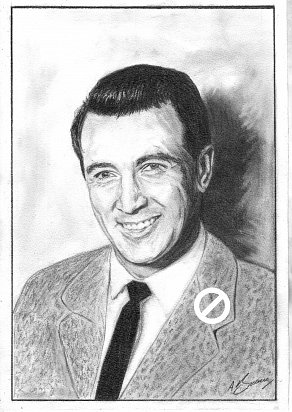Rock Hudson
Pencil Portrait by Antonio Bosano.

Shopping Basket
The quality of the prints are at a much higher level compared to the image shown on the left.
Order
A3 Pencil Print-Price £20.00-Purchase
A4 Pencil Print-Price £15.00-Purchase
*Limited edition run of 250 prints only*
All Pencil Prints are printed on the finest Bockingford Somerset Velvet 255 gsm paper.
P&P is not included in the above prices.

Recommended viewing
Ice Station Zebra (1968)
I saw this movie on the big screen which now rather makes me feel as old as Methusela.
Based on Alistair Maclean’s best selling novel, the movie focuses on a secret film capsule from a malfunctioning Russian spacecraft landing near Station Zebra, thus plunging the tiny weather base into a Cold War confrontation between the two super powers.
Equally adept at romantic comedies and light hearted thrillers, Hudson here plays it “staight down the line.” Taking on the role of Commander James Ferraday, a U.S. Navy submarine captain who embarks on a dangerous mission in the Arctic, he is commanding and authoritative in equal measure and more than comfortable amongst a stellar cast.
The claustrophobic tension inside the submarine builds nicely before breaking out convincingly when the search party heads out to the striken station, ably ssisted by Universal Studio’s arctic set. Unfortunately there is one standout special effects howler. The model Russian MiG fighters may look sufficiently convincing when filmed from above as they fly over the ice cap but the rear view shots are truly comical.
The movie posted box office returns of $12m, eventually moving into profit. Despite critical reservations about its overlong running time, the screenplay maintains viewer interest throughout.
After several box office flops (some undeservedly so), Ice Station Zebra would restore Hudson’s box office clout, a shame therefore that its premiere would prove such an uncomfortable experience for the enigmatic star. Verbally hounded by a handful of unruly homophobes, he would not attend a similar public event again in his lifetime.


Comments
Last Update : 12/03/23
I’ve recently been reappraising some of Rock Hudson’s cinematic and television work via the Internet Archive. Born Roy Harold Scherer Jr.; he was one of the most popular movie stars of his time, with a screen career spanning more than three decades. A prominent heartthrob in the Golden Age of Hollywood, he achieved stardom with his role in Magnificent Obsession (1954), followed by All That Heaven Allows (1955), and Giant (1956), for which he received a nomination for the Academy Award for Best Actor. Hudson also found continued success with a string of romantic comedies co-starring Doris Day: Pillow Talk (1959), Lover Come Back (1961), and Send Me No Flowers (1964). In the 70’s, he would forge an equally successful career in television – “MacMillan & Wife” and an adaptation of Arthur Hailey’s “Wheels” spring readily to mind.
Although discreet regarding his sexual orientation, it was known among Hudson’s closest colleagues in the film industry that he was homosexual (I make no apologies for not using the G word; surely one of the most ridiculous hijackings of a descriptive term for being carefree – it’s embarrassing now to sing even the Flintstones theme let alone a plethora of songs from the Great American Songbook 1900-1950).
In 1984, Hudson was diagnosed with AIDS and was the first major celebrity to die from an AIDS-related illness, on October 2, 1985, at the age of 59. At the time of his death, AIDS was not fully understood by the medical community and the disease was stigmatized by the general public as a condition affecting only homosexual men, intravenous drug users and people who received contaminated blood transfusions.
As well as some of the film titles already mentioned, he was a consummate light comedian – “Come September” (1961)and “Strange Bedfellows (1965) with Gina Lollobrigida being obvious examples, but it is the dark psychological science fiction movie “Seconds” (1966) which highlights his versatility.
An extremely professional and well liked personality in Hollywood, his movies – with the exception of one or two – rarely play on terrestrial television; an undeserving fate for someone who was a top drawer star. It appears as if his acting reputation remains as stigmatized as his private life. In today’s world with advanced treatments, he may well have survived in more ways than one.